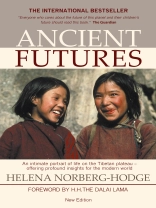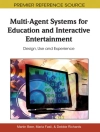A moving portrait of tradition and change in Ladakh, or “Little Tibet, ” Ancient Futures is also a scathing critique of the global economy and a rallying call for economic localization.
When Helena Norberg-Hodge first visited Ladakh in 1975, she found a pristine environment, a self-reliant economy and a people who exhibited a remarkable joie de vivre. But then came a tidal wave of economic growth and development. Over the last four decades, this remote Himalayan land has been transformed by outside markets and Western notions of “progress.” As a direct result, a whole range of problems—from polluted air and water to unemployment, religious conflict, eating disorders and youth suicide—have appeared for the first time.
Yet this is far from a story of despair. Social and environmental breakdown, Norberg-Hodge argues, are neither inevitable nor evolutionary, but the products of political and economic decisions—and those decisions can be changed. In a new Preface, she presents a kaleidoscope of projects around the world that are pointing the way for both human and ecological well-being. These initiatives are the manifestation of a rapidly growing localization movement, which works to rebuild place-based cultures—strengthening community and our connection with nature.
Ancient Futures challenges us to redefine what a healthy economy means, and to find ways to carry centuries-old wisdom into our future. The book and a related film by the same title have, between them, been translated into more than 40 languages.
A propos de l’auteur
Helena Norberg-Hodge has been promoting an economics of personal, social and ecological well-being for four decades. She is the Director of the non-profit Local Futures, producer and co-director of the award-winning documentary The Economics of Happiness, and the author of Local is Our Future and the inspirational classic, Ancient Futures. She was honored with the Right Livelihood Award (or ‘Alternative Nobel Prize’) for her groundbreaking work in Ladakh, India, and received the 2012 Goi Peace Prize for contributing to “the revitalization of cultural and biological diversity, and the strengthening of local communities and economies worldwide.”












